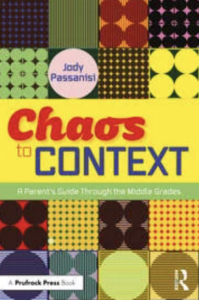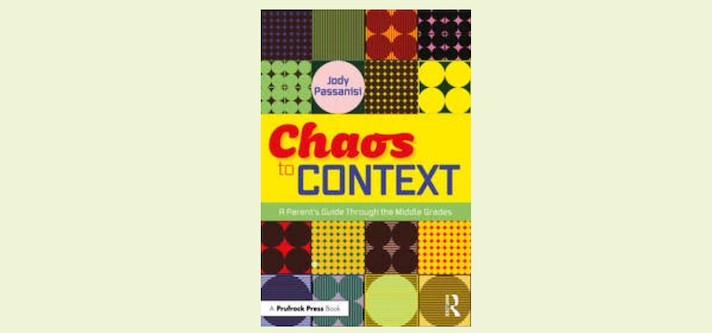Chaos to Context: A Parent’s Guide Through the Middle Grades
By Jody Passanisi
(Routledge/Prufrock Press, 2025 – Learn more)
Reviewed by Sarah Cooper

 One of the best parts of Jody Passanisi’s wise new book, Chaos to Context: A Parent’s Guide Through the Middle Grades, is that it asks us to remember what it was like to be thirteen.
One of the best parts of Jody Passanisi’s wise new book, Chaos to Context: A Parent’s Guide Through the Middle Grades, is that it asks us to remember what it was like to be thirteen.
Even as I’ve spent my work days with middle schoolers for a quarter century and parented two of them, I don’t access these memories often enough. When I do, I find renewed empathy by remembering the drama projects that a beloved English teacher assigned, the sugar high from chocolate malts at lunch, the bench next to the bathroom where my friends and I spent morning break.

 Although so much has changed since today’s parents were middle schoolers, questions Passanisi raises in the introduction bring back the unchanging emotions of that time, including: “Did you lose a good friend? Did you gain a good friend? Were you into something specific? Did you struggle emotionally/psychologically? Did you discover a love of a content area? Science? History?”
Although so much has changed since today’s parents were middle schoolers, questions Passanisi raises in the introduction bring back the unchanging emotions of that time, including: “Did you lose a good friend? Did you gain a good friend? Were you into something specific? Did you struggle emotionally/psychologically? Did you discover a love of a content area? Science? History?”
Throughout the book, Passanisi offers a calm “we’ll make it” perspective earned from fifteen-plus years of working with middle graders as a teacher, administrator and now parent.
She acknowledges that parenting is stressful these days, including a torrent of online information that feels like a “fire hose” and the sense that we need to be “ALL prevention, ALL the time” – constantly monitoring our kids’ use and mental health.
In addition, many high-aspiring parents subscribe to the “Total Success Principle,” which implies that “every possible thing, depending on your personal values system (academics, material wealth, network, social status, etc.), should be provided for children, and if you have it and it’s not provided you are doing your children a disservice.”
We need to remember, as Passanisi writes at the beginning of the book, that we are all imperfect parents – and this is a good thing! Not being able to tractor-beam in and solve every real or potential problem faced by your children actually benefits their maturity.
Being constantly anxious about their issues can backfire, too. In the introduction Passanisi cites a Harvard Graduate School of Education study showing that “anxious teens are about three times more likely than non-anxious teens to have an anxious parent.”
To help parents listen carefully along the journey, Chaos to Context begins with brain science and continues through social, academic, technological and ethical chapters:
- Spoiler Alert: It’s Puberty. Puberty’s the Problem
- Unveiling the Adolescent Brain
- It’s Time for Identity Exploration
- The Changing Social Dynamics of Middle School
- The Role of Grown-Ups in the Middle Grades
- Academics and Middle School: A New Frontier
- Our Collective Challenge: Technology, Social Media, and the Middle Grades
- Good People Who Do Good Things
- Conclusion: From Chaos to Context
But how to respond calmly to the hyperbole that middle schoolers often bring to descriptions of mundane events? Parents can encourage them to “right-size” their problems, whether that’s “nodding and listening” or pulling out an eternally helpful question: “Do you want me to listen, or do you want me to help you problem-solve?” With topics such as shifting friendships, which are totally normal and in fact completely expected at this turbulent stage, it’s sometimes best to withhold judgment, at least temporarily.
In addition, helping our kids gaze toward actionable steps by asking, “I wonder what you can do next?” or “What can you do right now that will help you feel better?” is a gift we can give to develop autonomy. Such questions can apply also to difficult ethical topics, where your child may have taken the high or the low ground: “I wonder if we can figure out a way of thinking through this situation … that helps you feel less icky about your choices” or “I wonder if they have something going on that we aren’t aware of.”
Making yourself available
One important message that runs through this commonsensical book is that we as parents can often do better by doing less, by stepping back – by letting our children choose, solve, imagine, backtrack and relate on their own. This approach doesn’t mean we don’t care – quite the opposite! It means we trust our kids enough to come to us to sort through their problems and then implement their own, often imperfect solutions without us.
Growing up is not a linear process. It’s hard to watch sometimes, it’s iterative, it moves forward and back. But as Passanisi and those of us who have been admiring middle schoolers for decades would attest: If you make yourself available to listen, “They will see that you are trying to see and hear them, even though you, as a human, make mistakes. Which they appreciate because it allows them to be human too.”
Jody Passanisi wrote
Why It’s Hard to Teach & Parent Middle Graders
for MiddleWeb in March 2025.
Sarah J. Cooper teaches eighth-grade U.S. History and is Associate Head of School at Flintridge Prep in La Canada, California, where she has also taught English Language Arts. Sarah is the author of Making History Mine (Stenhouse, 2009) and Creating Citizens: Teaching Civics and Current Events in the History Classroom (Routledge, 2017). She presents at conferences and writes for a variety of educational sites. You can find all of Sarah’s writing at sarahjcooper.com.








